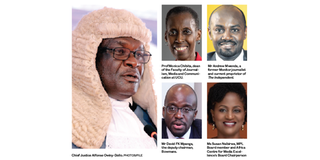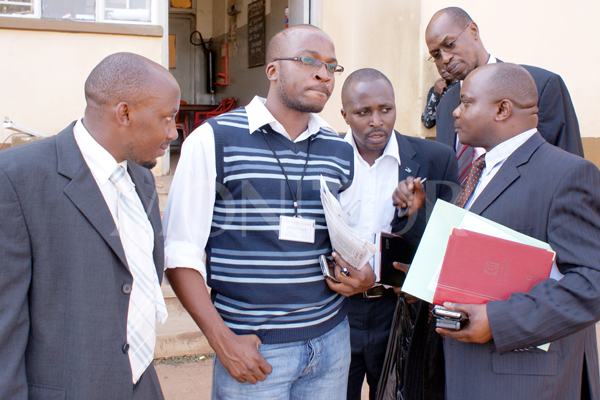Prime
Chief Justice to give keynote speech at Monitor Lecture

What you need to know:
- Background. The Monitor Publications Ltd (MPL), which publishes the Daily Monitor, was founded on July 24, 1992 by a group of journalists, who broke away from the Weekly Topic. The newspaper was originally named The Monitor, and renamed Daily Monitor during a relaunch in June 2005.
The Monitor Publications Ltd (MPL), publisher of the Daily Monitor newspaper, will tomorrow hold an invite-only, high-level public dialogue at Kampala Serena Hotel to commemorate its 30th anniversary.
The publication was founded by Mr Phillip Wafula Oguttu, Mr David Ouma Balikoowa, Mr Charles Onyango Obbo, Mr Jimmy Serugo, Ogen Kevin Aliro, Richard Tebere and Teddy Seezi Cheye and produced its first edition on July 24, 1992.
The founders proclaimed in the inaugural editorial that they established newspaper as a platform to allow “all schools of thought and views to contend in debates as part of a national growth towards tolerance, respect of other people’s opinions and create democracy”.
This element of discourse on important national development issues returns to the fore tomorrow when 200 invited guests assemble in Victoria Hall at 7:30am for breakfast and public lecture where Chief Justice Alfonse Owiny-Dollo will deliver a keynote address on the topic, 60 Years of Independent Uganda: Monitor and Nation Building.
The overall theme of the 30th anniversary celebrations is: Celebrating the Past and Shaping the Future.
Tomorrow’s event will start with breakfast at 7:30am while the main lecture, which will also be televised live on NTV-Uganda, will run from 9am to 11:30am.
The Chief Justice’s presentation will be discussed by a panel comprising Prof Monica Chibita, the dean of the Faculty of Journalism, Media and Communication at Uganda Christian University (UCU); Mr Andrew Mwenda, a former Monitor journalist and current proprietor of The Independent; MPL Board member and Africa Centre for Media Excellence’s Board Chairperson Susan Nsibirwa; and Mr David FK Mpanga, the deputy chairman, Bowmans.
Mr Daniel Kalinaki, the general manager, editorial, Nation Media Group-Uganda (NMG-U), will moderate the discussions.
British High Commissioner Kate Airey and National Unity Platform leader Robert Kyagulanyi, alias Bobi Wine, are among high profile guests including university chancellors and chief executives of banks that have confirmed participation in the dialogue.
The United States Ambassador Natalie Brown, who tomorrow will be hosting the visiting US envoy to the United Nations, Ms Linda Thomas Greenfield, has delegated Ellen Masi, the new public affairs officer, and Ms Dorothy Nanyonga, the press and information specialist, at the US embassy in Kampala.
Mr Tony Glencross, the managing director of NMG-U, in explaining why the public lecture is being organised to mark the newspaper’s 30th anniversary, said:
“One of the things that The Monitor has continuously championed right from inception is robust debate and free speech, and over the years The Monitor and the larger Nation Media Group have come to be known for this. So, a public dialogue, is our way of keeping this tradition.”
Mr Mpanga, one of the panellists, commended the publication for its contribution to nation building through creating space for public discourses and holding power, both government and the private sector, to account.
He added that the publication should constantly re-dedicate itself to telling the truth, even “inconvenient” truths.
“What it needs is close adherence to the slogan, ‘Truth Every day’,” he said, referring to the newspaper’s tagline. “There are some obvious truths that we know and it is nice to be reminded of those, but the bigger responsibility is finding the hidden truth.”
He added: “The truth that people may not want exposed, that is more than public relations that may be inconvenient even to the Daily Monitor. It is what made the Daily Monitor great ... it was the times when you pushed the bolt out to say we may not be allowed to say this, but we must because there is bigger public interest in saying it.”
On her part, Ms Nsibirwa, whose byline graced the maiden edition of The Monitor, said the paper has over the past three decades built the careers for future influential persons and professionals serving the country in different fields.
“When you look at some of the big names out there, for example, in communications, it’s really been a ground, a foundation to many careers of people doing great things. So, many names can attribute their foundations to The Monitor,” she said.
The Monitor, she said in apparent reference to the newspaper’s characterisation by President Museveni, should continue to be ‘the bad paper’.
“By calling a spade a spade because it makes things happen, every authority needs someone who checks their excesses and holds them to account. There is a price to pay for it ,but it should continue [the no-holds-barred reporting],” Ms Nsibirwa said.
She advocated for better welfare of journalists for the profession to thrive and media enterprises to survive.
“We need to see how we can create a sustainable business model that allows us to take better care of our journalists because for people who put themselves on the frontline to keep us informed on a daily basis, I really would like to see them taken better care of,” she said.
Prof Chibita said The Monitor still has a major role to ensure continuity of the profession through offering mentorship for future journalists.
On its role in nation building, she argued for continuation of accurate, and neutral journalism to influence the state of affairs.
Profile of Owiny-Dollo
Chief Justice Alfonse Chigamoy Owiny-Dollo is a Ugandan lawyer and judge. He has been serving as Chief Justice since August 2020. Prior to being appointed Chief Justice, he was the Acting Chief Justice from June of that year after the then Chief Justice, Justice Bart Katureebe, retired upon clocking 70 years.
Prior to that, he was the Deputy Chief Justice, a position he assumed on September 30, 2017 following the retirement of Justice Steven Kavuma, who attained the mandatory retirement age of 70 years on September 29, 2017.
He was born on January 18, 1956 in present-day Agago District. He holds a Bachelor of Laws degree from Makerere University, and a Diploma in Legal Practice from the Law Development Centre in Kampala.
Justice Owiny-Dollo holds a Master of Arts in Conflict Resolution from the University of Bradford in the United Kingdom. He also has a certificate in advanced conflict mediation skills, obtained from the Center for Conflict Resolution, in Cape Town, South Africa.
In 1988, Owiny-Dollo served as legal counsel in the peace talks between the then rebel outfit, Uganda People’s Democratic Movement (UPDM), and the government of Uganda. In that capacity, he wrote the peace agreement executed between the government and UPDM, on June 3, 1988, at Pece Stadium, in Gulu.
From 1994 until 1996, he was a member of the Constituent Assembly that discussed and promulgated the 1995 Uganda Constitution. He also served as a Member of Parliament, representing Agago County in the 6th Parliament (1996–2001).
During the talks between the Lord’s Resistance Army rebel group of Joseph Kony and the National Resistance Movement government of Uganda, from 2006 until 2008, Owiny-Dollo served as legal counsel to Reik Machar, the Vice President of South Sudan, who mediated the talks.
In 2008, he was appointed to the High Court of Uganda, serving until 2015 when he was elevated to judge of the Court of Appeal of Uganda. However, he couldn’t immediately take up his appointment because he was hearing a terrorism case in the High Court, in which 13 men were accused of killing 76 people in twin bombings in Kampala in 2010.
He disposed of that case in May 2016 before moving on to the Court of Appeal where he had a short stint.
In August 2017, the President appointed him as the Deputy Chief Justice and under Ugandan law, the head of Uganda’s Court of Appeal and Uganda’s Constitutional Court.
Under him as the head of the Judiciary, several changes have happened including recruiting more judicial officers, mainly judges and magistrates.
He has also overseen the construction of homes for two appellate courts; Court of Appeal and Supreme Court.




